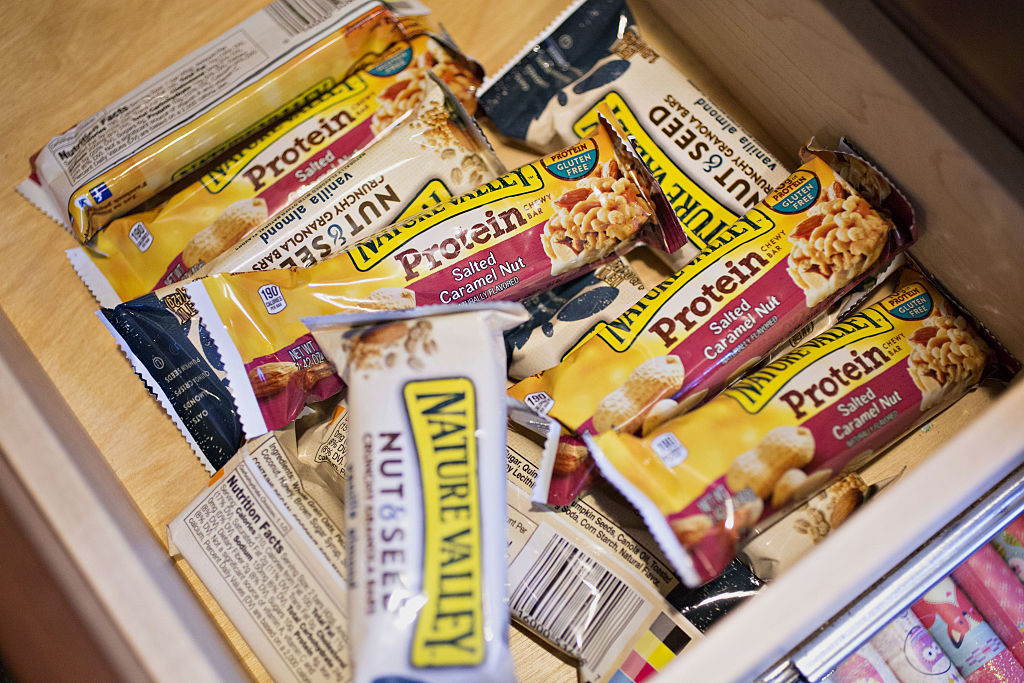Lawmakers Are Rolling Back Food Safety Rules
In the deal to end the government shutdown, lawmakers added clauses that would temporarily bar states from regulating which foods manufacturers can label “healthy” and suspend new listeria regulations.

Cereal companies have opposed a Biden-era food labeling rule, claiming that it would “disqualify many grain foods . . . from using the term ‘healthy.’” (Daniel Acker / Bloomberg via Getty Images
After the Senate buried provisions stripping food safety regulations in its emergency spending bill to end the forty-four-day government shutdown, the House followed suit and introduced additional clauses that would temporarily bar states from regulating which foods manufacturers can label “healthy” and suspend new listeria regulations for “low-risk ready-to-eat” foods, according to a Lever review of the legislation.
The move follows a multimillion-dollar lobbying blitz and pushback from companies and organizations that stand to benefit from the provisions. It also comes amid growing public concern over listeria outbreaks, including those linked to ready-to-eat foods that regulators generally consider low risk.
The House spending bill includes a provision, effective until 2028, that bars states from enacting their own labeling requirements for foods deemed “healthy,” such as restricting the definition to foods with limited amounts of saturated fats and added sugars. The provision also establishes a grace period for food companies to adopt new “healthy” food labeling changes.
The changes are a response to a Biden-era Food and Drug Administration (FDA) rule that updated the definition of “healthy” foods. The 2022 rule placed limits on the amount of saturated fats, cholesterol, sodium, and added sugars that can be found in foods labeled by their manufacturers as healthy. The final rule was implemented in 2024 with the hope that it “may result in lower incidence of diet-related chronic diseases, including cardiovascular disease and type 2 diabetes.”
Cereal companies General Mills, Kellogg’s, and Post Consumer Brands opposed the rule, claiming in a February 2023 letter to regulators that it would “disqualify many grain foods, including the overwhelming majority of the ready-to-eat cereals on the market, from using the term ‘healthy.’”
The Consumer Brands Association, a top food industry lobbying group, wrote in a 2023 letter to the FDA that the new “healthy” definition is “overly restrictive and results in a regulatory framework that would automatically disqualify a vast majority of packaged foods.” The industry group has spent more than $2 million so far this year lobbying the White House, Congress, and food regulators on food labeling issues and other matters, disclosures show.
On his first day in office, President Donald Trump signed an executive order suspending the enforcement of various regulatory rules, including the healthy food labeling rule.
Risky Rules
Another clause in the House spending bill would bar funds for the FDA “to issue or promote any new guidelines or regulations applicable to food manufacturers of low-risk ready-to-eat (RTE) foods for Listeria monocytogenes” until the FDA considers “new science” for its policy guidance on the matter.
According to the Department of Agriculture, low-listeria-risk ready-to-eat foods include fully cooked eggs and fish as well as many prepackaged sandwiches and salads. But some of these foods have triggered listeria outbreaks in the recent past, such as hard-boiled eggs, and the FDA recently discovered listeria at a food processing facility in California that makes and sells ready-to-eat sandwiches, salads, and other foods.
The provision in the bill comes after six people died and twenty-seven became seriously ill this year after eating listeria-contaminated pasta meals sold at major grocery stores, although such foods are not generally considered “low risk.”
On top of the Consumer Brands Association’s 2025 lobbying efforts, food manufacturing companies have spent more than $2 million since January lobbying the White House, Congress, the FDA, and other regulators on food labeling requirements, nutritional issues, and other matters, disclosures show.